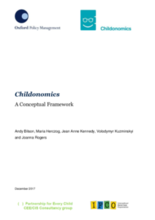Displaying 401 - 410 of 909
The aim of this study was to assess the impact of ‘Parenting for Lifelong Health: Sinovuyo Teen’, a parenting programme for adolescents in low-income and middle-income countries, on abuse and parenting practices.
This study uses data from the recent Modern Adoptive Families survey to understand parent perspectives on their preparation for adoption.
The objective of this study is to examine suicide attempts and completions among mothers who had a child taken into care by child protection services (CPS).
This essay critically engages with the 2030 Global Agenda and assesses the potential of the SDGs to transform our world to enable all children – regardless of race, gender, ability, or social background – to not only survive but thrive.
This paper presents the conceptual framework for the Childonomics research project, which has developed the first iteration of a methodology that helps people to reflect on the long-term social and economic return of investing in children and families within a given national or sub-national context.
Guided by the Cultural Competence Attainment Model, the purpose of this study is to examine how socio‐demographic and work characteristics are associated with variations in child welfare professionals' (CWPs) attitudes about father involvement and family instability and how these attitudes are linked with whether they view relationship and marriage education as relevant to their efforts to support families.
This chapter describes the contemporary situation of children in sub-Saharan Africa with successive foci on child growth, the home environment, parenting, and discipline using data from the Multiple Indicator Cluster Survey (MICS).
This handbook showcases science-based interventions that have been demonstrated effective in promoting attachment security, this is a vital reference and clinical guide for practitioners.
This qualitative study examined caregivers' experiences with SafeCare®, an evidence‐based programme that focuses on child neglect through modules on health, safety, and parenting.
In this study, the effects of the International Child Development Programme (ICDP) and the specific addition of a violence prevention module were observed in a preidentified population in Colombia where children are experiencing high levels of violence.



